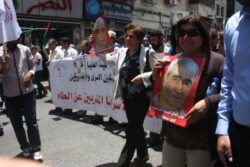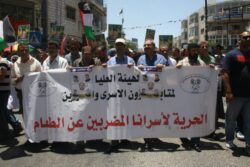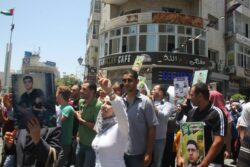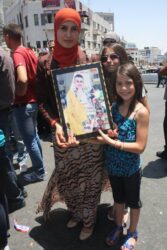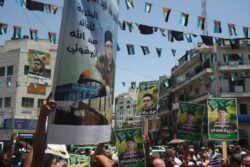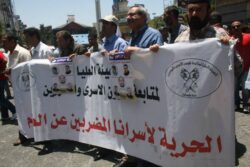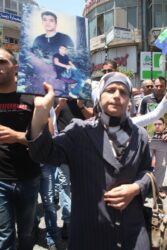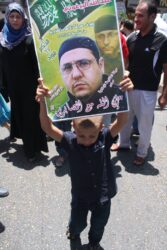 A detainee at the US prison explains that hunger striking is the only way left to cry out for life, freedom and dignity. From Al-Jazeera.
A detainee at the US prison explains that hunger striking is the only way left to cry out for life, freedom and dignity. From Al-Jazeera.
by Moath al-Alwi
Moath al-Alwi is a Yemeni national who has been in US custody since 2002. He was one of the very first prisoners moved to Guantanamo, where the US military assigned him the Internment Serial Number 028.
A month ago, the guards here at Guantanamo Bay gave me an orange jumpsuit. After years in white and brown, the colours of compliant prisoners, I am very proud to wear my new clothes. The colour orange is Guantanamo’s banner. Anyone who knows the truth about this place knows that orange is its only true colour.
My name is Moath al-Alwi. I have been a prisoner of the United States at Guantanamo since 2002. I was never charged with any crime and I have not received a fair trial in US courts. To protest this injustice, I began a hunger strike in February. Now, twice a day, the US military straps me down to a chair and pushes a thick tube down my nose to force-feed me.
When I choose to remain in my cell in an act of peaceful protest against the force-feeding, the prison authorities send in a Forced Cell Extraction team: six guards in full riot gear. Those guards are deliberately brutal to punish me for my protest. They pile up on top of me to the point that I feel like my back is about to break. They then carry me out and strap me into the restraint chair, which we hunger strikers call the torture chair.
A new twist to this routine involves the guards restraining me to the chair with my arms cuffed behind my back. The chest strap is then tightened, trapping my arms between my torso and the chair’s backrest. This is done despite the fact that the torture chair features built-in arm restraints. It is extremely painful to remain in this position.
Even after I am tied to the chair, a guard digs his thumbs under my jaw, gripping me at the pressure points and choking me as the tube is inserted down my nose and into my stomach. They always use my right nostril now because my left one is swollen shut after countless feeding sessions. Sometimes, the nurses get it wrong, snaking the tube into my lung instead, and I begin to choke.
The US military medical staff conducting the force-feeding at Guantanamo is basically stuffing us prisoners to bring up our weight – mine had dropped from 168 pounds to 108 pounds, before they began force-feeding me. They even use constipation as a weapon, refusing to give hunger strikers laxatives despite the fact that the feeding solutions inevitably cause severe bloating.
If a prisoner vomits after this ordeal, the guards immediately return him to the restraint chair for another round of force-feeding. I’ve seen this inflicted on people up to three times in a row.
Even vital medications for prisoners have been stopped by military medical personnel as additional pressure to break the hunger strike.
Those military doctors and nurses tell us that they are simply obeying orders from the colonel in charge of detention operations, as though that officer were a doctor or as if doctors had to follow his orders rather than their medical ethics or the law.
But they must know that what they are doing is wrong, else they would not have removed the nametags with their pseudonyms or numbers. They don’t want to be identifiable in any way, for fear of being held accountable someday by their profession or the world.
I spend the rest of my time in my solitary confinement cell, on 22-hour lockdown. The authorities have deprived us of the most basic necessities. No toothbrushes, toothpaste, blankets, soap or towels are allowed in our cells. If you ask to go to the shower, the guards refuse. They bang on our doors at night, depriving us of sleep.
They have also instituted a humiliating genital search policy. I asked a guard why. He answered: “So you don’t come out to your meetings and calls with your lawyers and give them information to use against us.”
But the prisoners’ weights are as low as their spirits are high. Every man I know here is determined to remain on hunger strike until the US government begins releasing prisoners.
Those of you on the outside might find that difficult to comprehend. My family certainly does. If I’m lucky, I’m allowed four calls with them each year. My mother spent most of my most recent call pleading with me to stop my hunger strike. I had only this to say in response: “Mom, I have no choice.” It is the only way I have left to cry out for life, freedom and dignity.
Moath al-Alwi is a Yemeni national who has been in US custody since 2002. He was one of the very first prisoners moved to Guantanamo, where the US military assigned him the Internment Serial Number 028.
This article was translated from Arabic by his attorney, Ramzi Kassem.
 OFER MILITARY COURT (AFP) — An Israeli military court formally charged two Palestinian women on Tuesday for their involvement in a peaceful demonstration in the West Bank last month.
OFER MILITARY COURT (AFP) — An Israeli military court formally charged two Palestinian women on Tuesday for their involvement in a peaceful demonstration in the West Bank last month.
 The Palestinian Prisoners Society warned about the serious health condition of Palestinian prisoner Dirar Abu Sisi, 42, who is held in isolation. Abu Sisi was the deputy director of the power plant in the Gaza Strip, who was abducted by the Mossad from the Ukraine, where he was visiting the family of his Ukrainian wife, on February 18, 2011. He has been held in solitary confinement since that time.
The Palestinian Prisoners Society warned about the serious health condition of Palestinian prisoner Dirar Abu Sisi, 42, who is held in isolation. Abu Sisi was the deputy director of the power plant in the Gaza Strip, who was abducted by the Mossad from the Ukraine, where he was visiting the family of his Ukrainian wife, on February 18, 2011. He has been held in solitary confinement since that time. The
The  The
The  The Palestine Information Centre
The Palestine Information Centre A detainee at the US prison explains that hunger striking is the only way left to cry out for life, freedom and dignity. From
A detainee at the US prison explains that hunger striking is the only way left to cry out for life, freedom and dignity. From  OR IMMEDIATE RELEASE Contact: Mousa Abu Maria (English and Arabic): 0598-139-590
OR IMMEDIATE RELEASE Contact: Mousa Abu Maria (English and Arabic): 0598-139-590 Former prisoner Rafat Hamdouna, director of the Center for Prisoners’ Studies, said that Ramadan for Palestinian prisoners will take place amid continuous violations of prisoners’ rights. Hamdouna noted that there is a long record of prison administrators’ interference and disruption of worship in the month of Ramadan, denying prisoners’ access to the general prison yard for evening prayers and failing to provide a prison chapel, despite the fact that full religious services and accommodation are provided to all Jewish criminal prisoners in occupation prisons. The prison administration provides irregular mealtimes and they often prevent the introduction of religious books during Ramadan.
Former prisoner Rafat Hamdouna, director of the Center for Prisoners’ Studies, said that Ramadan for Palestinian prisoners will take place amid continuous violations of prisoners’ rights. Hamdouna noted that there is a long record of prison administrators’ interference and disruption of worship in the month of Ramadan, denying prisoners’ access to the general prison yard for evening prayers and failing to provide a prison chapel, despite the fact that full religious services and accommodation are provided to all Jewish criminal prisoners in occupation prisons. The prison administration provides irregular mealtimes and they often prevent the introduction of religious books during Ramadan. Samidoun Palestinian Prisoner Solidarity Network expresses our solidarity and support with the
Samidoun Palestinian Prisoner Solidarity Network expresses our solidarity and support with the 